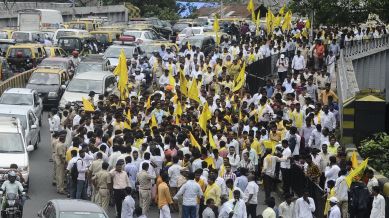Stay updated with the latest - Click here to follow us on Instagram
Prakash Sonawane says Mali, Dhangar and Vanjari communities corner all OBC benefits
The Maharashtra Balutedar Sanghatana president says several other OBC communities should get reservation under the Most Backward Classes category.

Several OBC castes and subcastes in Maharashtra are feeling left out and have demanded reservation under the Most Backward Classes category. Representatives of Nhavi (barber), Dhobi (washerman), Shimpi (tailor), Lohar (blacksmith) and Kumbhar (potter) communities have come together under the banner of Mi Balutedar to fight for their rights.
At a time when the Marathas are demanding reservation under the OBC category, a sizeable number of communities have expressed a desire to exit from the OBC list. Instead, they want reservation with a dedicated Most Backward Classes quota. The reason is simple: they believe most of the OBC reservation benefits go to two or three influential communities.
Said Maharashtra Balutedar Sanghatana president Prakash Sonawane, “Most of the OBC reservation benefits go to only three dominant communities—Mali, Dhangar and Vanjari—in Maharashtra. They overpower other communities also classified under the OBC.”
“They have a sizeable representation in the Legislative Assembly and Council. They have established leaders in political parties who protect the rights of their respective communities,” he said.
As a result, Sonawane said, the ones who are socially, economically and politically weak are deprived of reservation rights.
“Our fight is for the ‘vanchit’ (deprived) within the OBC category,” he said.
Sonawane further argued that over the years Mali, Dhangar and Vanjaris had socially, economically and politically developed manyfold and that they were enjoying the fruits of reservation.
“The Justice Rohini Commission report should be implemented in letter and spirit,” he said.
The report has been submitted to the Centre, which has kept it under wraps. In 2017, the commission headed by Justice Rohini, a retired Delhi High Court judge, was constituted to study the extent to which OBC reservation was concentrated within certain dominant castes and the extent to which others were deprived.
Maharashtra has 52 per cent lower-caste reservation. The breakup is as follows: Scheduled Castes 13 per cent, Scheduled Tribes 7 per cent, OBC 19 per cent, SBC 2 per cent, Vimukta Jati 3 per cent, Nomadic Tribe B 2.5 per cent, Nomadic Tribe C-Dhangar 3.5 per cent, Nomadic tribe D-Vanjari 2 per cent. Apart from this, there is 10 per cent reservation for Economically Weaker Sections. Thus the total reservation goes up to 62 per cent.
The Marathas, who form 33 per cent of the population, are seeking reservation within the OBC category. On the other hand, OBC leaders representing Mali, Dhangar and Kunbis have opposed inclusion of Marathas within the category.
A senior OBC leader representing the Dhangar community, said, “I agree there have been injustices to some communities within OBCs.”
The Dhangars themselves have been fighting for reservation under the Scheduled Tribe category, something that was promised by successive governments.